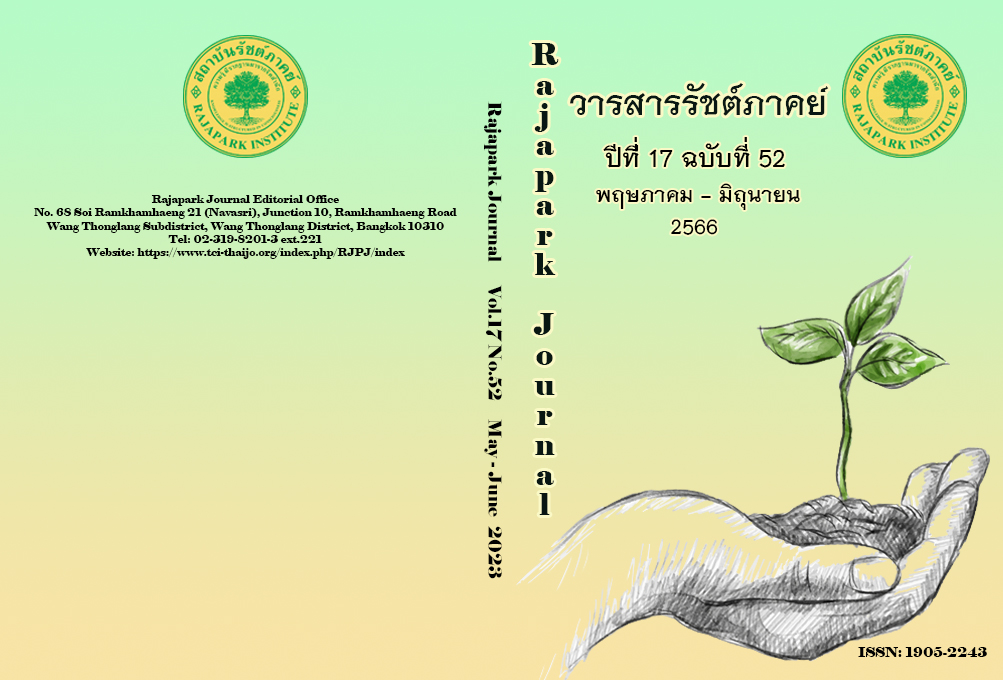Behaviors and Marketing Mix Affecting Customers’ Purchasing Decisions on Environmentally Friendly Products in Bangkok
Main Article Content
Abstract
The purpose of this research was to study Demographic characteristics, behaviors, and marketing mix affecting customers’ purchasing decisions on environmentally friendly products in Bangkok. A set of questionnaires was used to collect data from 400 samples of people who had purchased environmentally friendly products in Bangkok. Descriptive statistics and multiple regression were applied for data analysis. The results of this research found that most of the customers were self-employed females, aged 31-40 years old, with a bachelor's degree, and had an average monthly income of lower than or equivalent to 15,000 Baht. When considering the marketing mix based on the hypothesis testing separately, it was found that: in the aspect of the product, most consumers considered 4R features including reduce, reuse, recycle, and repair; in terms of price, most consumers were concerned about a reasonable price when compared to the value of environmentally friendly products; in the aspect of the place, most consumers thought that environmentally friendly products were widely distributed in general shopping malls and stores dedicated to selling environmentally friendly products; regarding marketing promotion, most consumers viewed that the campaigns of government organizations and related private sectors had a contribution to the environmental conservation trend.
Article Details

This work is licensed under a Creative Commons Attribution-NonCommercial-NoDerivatives 4.0 International License.
Views and opinions appearing in the Journal it is the responsibility of the author of the article, and does not constitute the view and responsibility of the editorial team.
References
Assurut, N., & Srisuphaolarn, P. (2008). Measuring Environmentally Friendly Consumption: An Exploratory Research. Chulalongkorn Business Review, 30(117-118), 145-156.
Bureerat, S. (2009). Teenage Consumers Attitude Towards Green Products in Bangkok[Master’s thesis, Chiang Mai University].
Chen, C.S. (2011). Green Organizational Identity: Sources and Consequence. Management Decision, 49(3), 384-404.
Farangthong, S. (2010). Driving Logistics Through Marketing. Expernet.
Kotler, P. (2003). Marketing Management. Prentice-Hall.
Kotler, P., & Armstrong, G. (2002). Principles of Marketing. Prentice-Hall.
Noo-urai, N., & Jaroenwisan, K. (2012). Sustainability Marketing: A New Paradigm toward Sustainability. Journal of Interdisciplinary Research Graduate Studies, 1(2), 36-44.
Pimdee, P. (2016). Green Consumption Behavior of Students: Confirmatory Factor Analysis. KMUTT Research and Development Journal, 39(3), 317-326.
Ratpongporn, T. (2010). A Model of Consumer Behaviors in Purchasing Green Products[Doctoral Dissertation, Ramkhamhaeng University].
Sereerat, S. (2003). New Marketing Management. Thammasarn.
Smithkrai, C. (2010). Consumer Behavior. Chulalongkorn University.
Svensson, G., & Wagner, B. (2012). Business Sustainability and E-footprints on Earths life and Ecosystems: Generic Models. European Business Review, 24(6), 543-552.
Thai Trade Center, Miami, Department of International Trade Promotion. (2016, June 23). Lean Label Market Report: Food Trends Coming Stronger in the United States. DITP. https://oldweb.ditp.go.th/contents_attach/149093/149093.pdf
Treemethasoontorn, C. (2005). Building Brand Image. Faculty of Industrial Education, Institute of Technology King Mongkut’s Ladkrabang.
Water and Environment Institute for Sustainability. (2019). Eco-Products. https://weis.fti.or.th/eco-products/
Yamane, T. (1973). Statistics: An Introductory Analysis (3rd ed.). Harper and Row.


